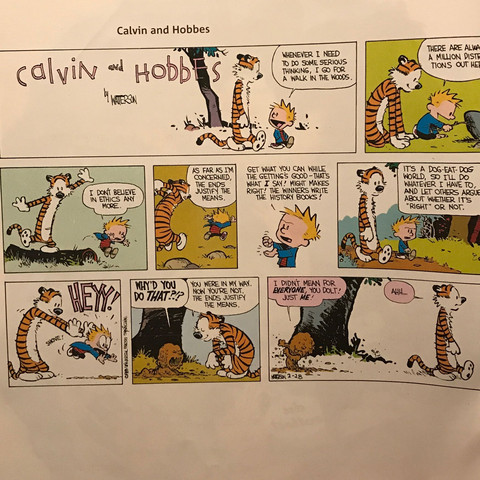Was möchte dieses Comic aussagen?

4 Antworten

Da es ein US-Comic ist, brauchst du vielleicht eine Profi-Interpretation auf Englisch. ;) Findest du unten. Es geht im Comic um die logische Begründung, warum MORALISCH sein die BESSERE und ERFOLGREICHERE Lösung ist. Es geht dir besser, wenn du nicht von Egozentrikern attackiert wirst, aber das kannst du von anderen nur verlangen und erwarten, wenn du selber auch andere nicht rumschubst. "Only me! Nur ich darf das, die anderen nicht - wird nicht funktionieren, denn du (wer immer du bist) bist nicht der Sonnengott, sondern auch nur ein Menschlein wie die anderen auch." Weil es für DICH und für ALLE ANDEREN besser ist nicht zu schubsen UND nicht geschubst zu werden als andere rumzuschubsen UND rumgeschubst zu werden, ist SOZIALES Verhalten besser. Darum SIND wir sozial. Naja, die meisten und die meiste Zeit über - sogar Psychophaten. Calvin sieht das am Ende des Comics noch nicht ein, der Tiger weiß es schon von Beginn an und der Leser wird es wohl verstehen - dachte sich der Autor.
The feline (der katzenartige, also der Tiger) Hobbes, like his human namesake (also wie der wichtige Philosoph Thomas Hobbes - auf wikipedia mehr dazu) , has shown why an amoral egoist is in an untenable (unhaltbarer) position. He is better off if he never gets shoved into the mud, but he can hardly demand that others refrain from shoving him if he himself is not willing to forgo shoving others. And since one is better off not shoving and not getting shoved than shoving and getting shoved, it pays to insist on a moral code, even if the price is adhering to it oneself. As moral philosophers through the ages have pointed out, a philosophy of living based on “Not everyone, just me!” falls apart as soon as one sees oneself from an objective standpoint as a person just like others. It is like insisting that “here,” the point in space one happens to be occupying at the moment, is a special place in the universe.
The dynamic between Calvin and Hobbes (the cartoon characters) is inherent to social organisms, and there are reasons to believe that the solution to it — a moral sense — evolved in our species rather than having to be deduced from scratch by each of us after we've picked ourselves up out of the mud. (Steven Pinker, The blank slate)

Der Junge meint, dass man egoistisch sein muss, um seine Ziele zu erreichen. Der Tiger schubst ihn, dann meint der Junge, dass nur er egoistisch sein darf, die anderen aber nicht. Das spiegelt unsere Gesellschaft wieder.

Der Jung meint das Recht des Stärkeren ist legetim und sich rücksichtslos zu verhalten. Über Ethik sollen die anderen nachdenken. Der Tiger schupst ihn, der Junge beklagt sich, dass dies nur für ihn gilt und nicht allgemein gültig sein kann.
Der kategorische Imperativ lautet in seiner Grundform: „Handle nur nach derjenigen Maxime, durch die du zugleich wollen kannst, dass sie ein allgemeines Gesetz werde.“ Er ist im System Immanuel Kants das grundlegende Prinzip der Ethik.
Eigentlich wird das thematisiert.

The feline Hobbes, like his human namesake, has shown why an amoral egoist is in an untenable position. He is better off if he never gets shoved into the mud, but he can hardly demand that others refrain from shoving him if he himself is not willing to forgo shoving others. And since one is better off not shoving and not getting shoved than shoving and getting shoved, it pays to insist on a moral code, even if the price is adhering to it oneself. As moral philosophers through the ages have pointed out, a philosophy of living based on “Not everyone, just me!” falls apart as soon as one sees oneself from an objective standpoint as a person just like others. It is like insisting that “here,” the point in space one happens to be occupying at the moment, is a special place in the universe.3
The dynamic between Calvin and Hobbes (the cartoon characters) is inherent to social organisms, and there are reasons to believe that the solution {188} to it — a moral sense — evolved in our species rather than having to be deduced from scratch by each of us after we've picked ourselves up out of the mud. (Steven Pinker, The blank slate)
*wider